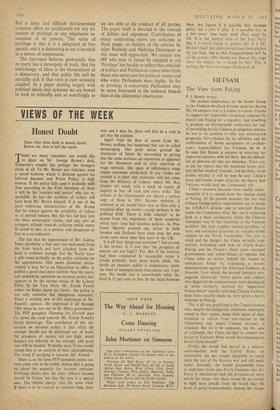VIEWS OF THE WEEK
Honest Doubt
There lives more faith in honest doubt, Believe me, than in half the creeds.
THERE are many reminders one would like to place on Mr. George Brown's desk. ennyson's couplet has perhaps the strongest claim of all. To Mr. Brown any criticism, even a raised eyebrow which is directed against his beloved Incomes and Prices Policy, is high treason. If the policy fails (and it probably will) then according to the First Secretary of State it will be the `sneerers and jeerers' who are re- sponsible. In fact the architect of failure will have been Mr. Brown himself. It is one of the most endearing characteristics of' Mr. Brown that he always ignores the possibility of failure or of partial success. But this has led him into the most extravagant claims, and also into an arrogant attitude towards criticism which seems ill suited to him as a person, and dangerous to him as a co-ordinator.
The fact that the appointment of Mr. Aubrey Jones (probably a bad one) was welcomed from the front bench and later attacked from the back is evidence enough that the Tories have a split mind probably on the policy, certainly on the appointment. This seems (however incon- venient it may be to an Opposition to differ in public) a good deal more realistic than the sunny and unthinking optimism on incomes policy that appears to be the current mood of the Labour Party'. In the Tory Party Mr. Enoch Powell makes no bones about his views: the policy is not only nonsense but `dangerous nonsense.' There is nothing new in this expression of Mr. Powell's opinion. He expressed it all through 1964 when he was not in Sir Alec's government. The PEP pamphlet Planning for Growth goes far down the road towards Mr. Enoch Powell's lonely hermitage. 'The conclusion of this dis- cussion on incomes policy is that while the attempt should not be dismissed out of hand, the prospects of success are not high, many dangers are inherent in the attempt, and great care will be needed.' Probably most Tories would accept that as an analysis of their schizophrenia. The trend if anything is towards Mr. Powell. There is, as the lame PEP pamphlet points out, even some risk in the public debate that is going on about the necessity for incomes restraint. Everyone thinks that the other fellow's income should be frozen, but that his own is a special case. The unions always take the same view. if there is to be control or restraint then, how-
ever sad it may be, there will first be a rush to get into the pipeline.
Apart from the flow of words from Mr. Brown, nothing has happened that can be called encouraging. One great union greeted the Statement of Intent by succeeding in getting into the same sentence an expression of approval for the Statement and of utter rejection of wage restraint. The spate of inflationary wage claims continues unchecked. If any claims are resisted it is clear that resistance will not come from the Ministry of Labour, where Mr. Ray Gunter sits ready with a stack of courts of inquiry to buy oil each and every strike. The actions of the Government are almost a carbon copy of those in 1961, Income restraint, if achieved at all, would have now as then only a marginal effect on events—except perhaps in the political field. There is little comfort to be drawn from the experience of those countries which have long had incomes policies. As Pro- fessor Merrett pointed out, prices in both Sweden and Holland have risen over the past seven years more than they have in the UK.
Is it all then 'dangerous nonsense'? Not proven is the verdict, Is it true that `the prospects of success are not high'? Yes. But if the exercise had been conducted in reasonable terms it would probably have been worth while. No doubt an incomes policy is unnecessary when the level of unemployment rises above, say. 3 per cent. No doubt one is unworkable when the level is 1 per cent or less. In the band between
these two figures it is possible that incomes . policy has a part to: play. It is possible that in a few years' time some small effect might he felt. It is the general view of the 'Tory Party that it is worth trying to achieve this. It is Mr. Brown'S fault that expectations have been pitched far too high, and so that disappointment will be all the greater. One should not then at this stage
shoot the pianist. is doing his best. That is perhaps the most alarming reflection of all.














































 Previous page
Previous page